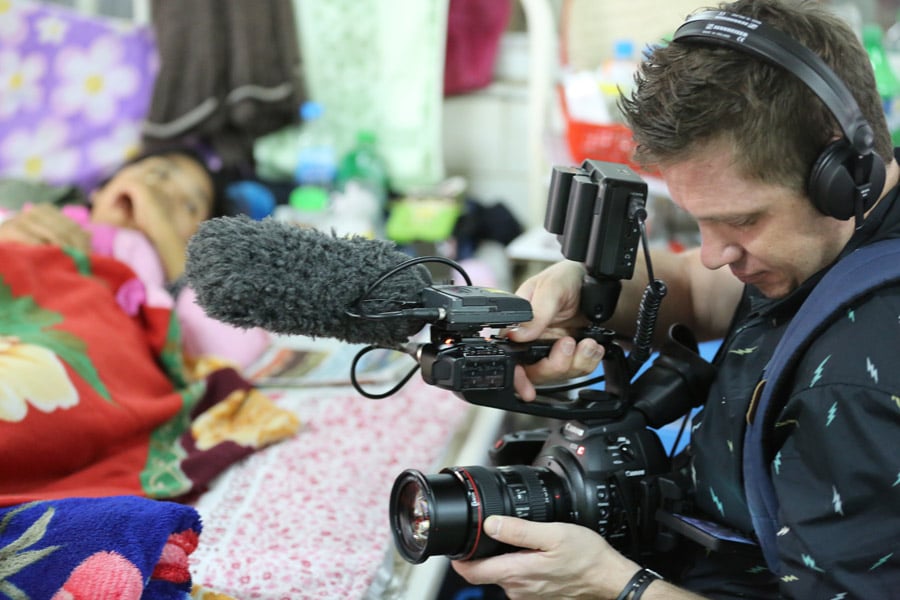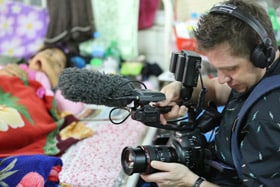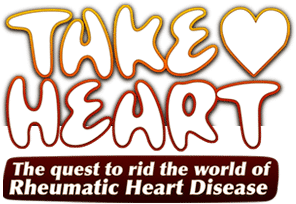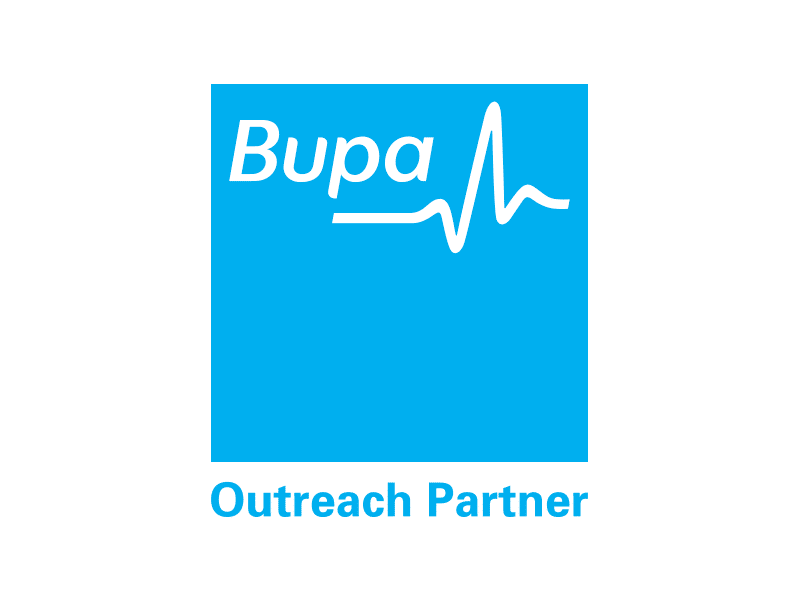NEWS

Why WE made this movie
Guest Blog by Director, Mike Hill – Moonshine Movies
Making films is a team sport and Take Heart is no exception.
The impetus for the project came from Dr Lyn Roberts AO while she was the leading the National Heart Foundation of Australia.
Lyn was familiar with one of our previous productions LIFE Before Death and spoke to my partner Sue Collins and I about the need for a global advocacy project around Rheumatic Heart Disease.
My response was something along the lines of: “Whaaaaa? Robotic Heart Disease?? Whatchoo talkin about Lyn?”
Now, over 3 years down the track, Rheumatic Heart Disease, or RHD, is firmly implanted in my vocabulary.
And this is really why we’re making this project. We feel everybody in Australia and New Zealand needs to know what Rheumatic Heart Disease is.
Perhaps one reason why RHD is so little-known in this part of the world is because it’s so shameful.
To think that Australia and New Zealand, countries ranked 2nd and 7th on the United Nation’s Human Development Index, still have a disease like this is a national disgrace.
Let me explain why…
Rheumatic Heart Disease is completely preventable. Yet, tragically, Australia and New Zealand’s first people have amongst the highest rates of this disease in the world.
In the Take Heart feature film, one of the stars of the show, Dr Bo Remenyi, observes that “if we had a similar outbreak of measles or meningitis, or even Ebola around the world, that would make the headlines and the news, whilst this is not something that the general public is aware.”
Here’s why we all need to know about RHD…
Rheumatic Heart Disease starts as a common sore throat and possibly infected skin sores in children typically aged between 5 and 15.
If children with a sore throat (“Strep Throat”) or infected skin sores as well as a fever or sore joints are not promptly treated with a course of antibiotics, they’re at risk of developing rheumatic fever.
To cut a long and rather complicated story short, rheumatic fever is an autoimmune reaction to Strep in the child’s body that, in some children, can lead to serious heart damage.
When this damage persists and becomes permanent it’s called Rheumatic Heart Disease, which is a life-long condition that all-too-often leads to open heart surgery, permanent disability, stroke, heart failure and premature death.
So otherwise healthy kids, through no fault of their own, can get this disease because it hasn’t been diagnosed and treated appropriately.
And one important reason it hasn’t been dealt with appropriately is because understanding and awareness of this disease amongst at-risk communities and their health services is not as high as it should be.
The reality of this travesty came into sharp focus for us as filmmakers while we were capturing the stories of young people living with the disease in Australia and New Zealand.
Given that an estimated 2% of Indigenous Australians and New Zealanders living in the ‘top end’ have RHD, it should come as no surprise that virtually every Indigenous person you talk to about the disease personally knows someone whose life has been diminished by it.
But it did come as a surprise to me – a very unpleasant surprise that challenged the way I thought about myself as an Australian.
Two of the film’s stars, Carlisa and Liddywoo, have had 7 open-heart surgeries between them before their 15th birthdays. This means years of inactivity, months in hospital and interstate surgeries running a health system tab totaling millions of dollars. Worse still, Carlisa has lost 4 members of her immediate family to the disease, including her mother…
Madness.
Beyond our shores Rheumatic Heart Disease is described as a “disease of poverty”. While it was once widespread in all parts of Australia up to 70 years ago, it now exists almost exclusively in Indigenous communities.
What does that tell us about Australia?
Rheumatic Heart Disease is linked to overcrowding and poor housing conditions (Strep is highly contagious and passes between children rapidly who sleep in close quarters). This, combined with a lack of access to effective health and education services, is at the root of the problem.
As we investigated the situation through the lenses of our cameras, we were shocked at the level of disadvantage we found. The societal failing we witnessed was exacerbated by the genuine relationships we were forging with the film’s participants and their communities.
These are good people, good kids, playing their hand in life as best they can and being brutally struck down by a disease that is 100% preventable.
No longer.
This story needs to be told, and told in a way that makes a difference to the lives of Indigenous children in Australia, New Zealand and beyond.
We all need to know what Rheumatic Heart Disease is so that we can prioritize its eradication and condemn it to the history books once and for all.
And by doing this relatively small thing we will also go some way to closing the gap on Indigenous disadvantage.
These kids and their communities need our help to amplify their stories as broadly possible so that decision makers hear this message loud and clear:
No child should suffer from preventable RHD in our country.
Sign up to the Take Heart newsletter to stay tuned and take control today.
Heartfelt thanks to the participants, cast, crew and sponsors of this important project. “Vision is the art of seeing what is invisible to others.”


















